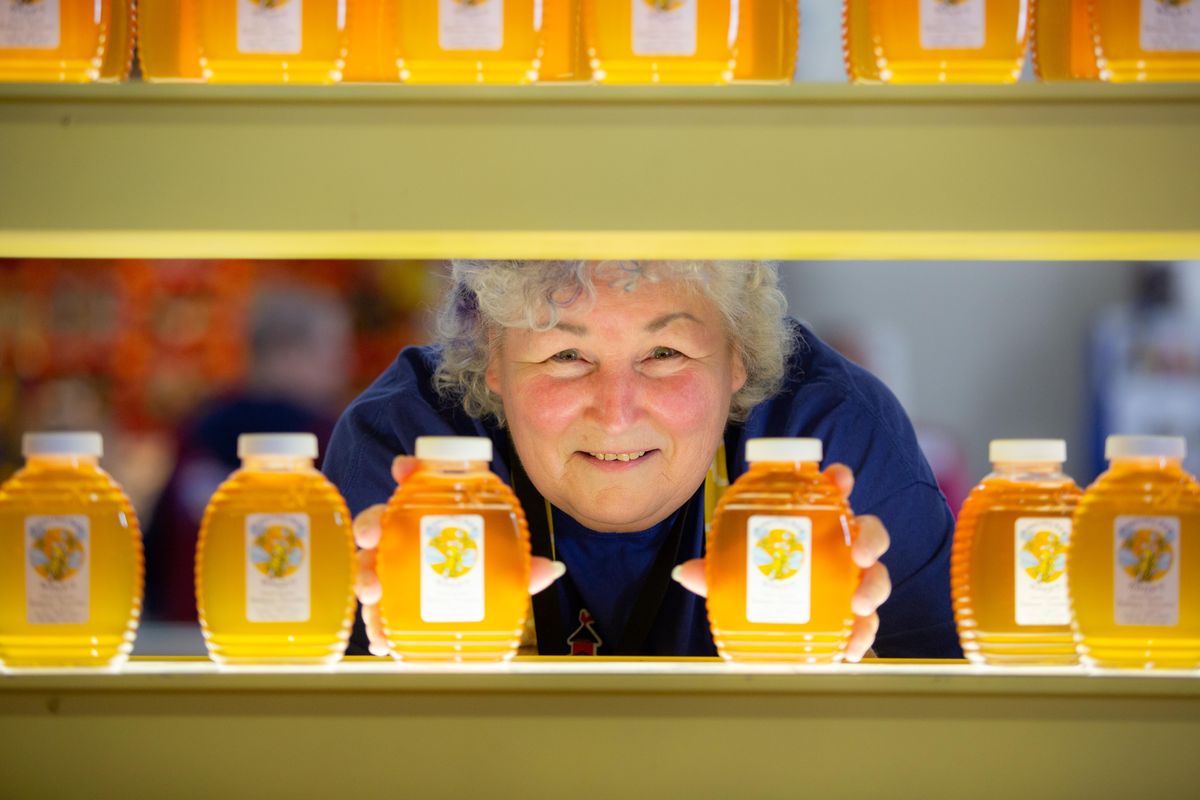Sweet deal: Spokane beekeepers offer info, honey at Interstate Fair

When Pat Ayers began beekeeping at her home in Hillyard, she was the only resident on the block harvesting honey.
“Now, there’s four to five other beekeepers in Hillyard,” she said.
Ayers, a certified beekeeper and owner and operator of Hillyard Honey Farm, is one of more than 300 members of the Inland Empire Beekeepers Association, which has maintained a booth at the Spokane County Interstate Fair for over 25 years.
The nonprofit association, which was founded in 1936, is a forum for hobbyists and professional beekeepers of all ages. It offers classes during the year, beginning with a basic beekeepers course that includes hands-on training with hives and provides testing for people to become certified apprentice beekeepers.
Apprentice beekeepers learn about feeding bees, honey extraction, using equipment and packaging honey. Beekeepers begin as a certified apprentice for three years, moving up the ranks to journeyman beekeeper. After more than six years of experience, they can become a master beekeeper.
“We have three master beekeepers in our association,” Ayers said.
Ayers, who has been beekeeping for four years, is studying to become a journeyman beekeeper. In her first year of beekeeping, she maintained two hives yielding 3 gallons of honey.
“The next year, I had 30 gallons of honey,” she said. “Every year is different depending on honey flow. Usually, during the first year of beekeeping, people are going to lose some hives. It’s a learning experience.”
Ayers said some neighbors initially were concerned when she set up hives in her backyard because they were allergic to bees. They came around in time, however, and she has been careful to follow the city’s urban beekeeping regulations, which determine the number of hives allowed per lot as well as requiring bee colonies to be in moveable frame hives isolated from public access.
“And, I gave (the neighbors) a jar of honey,” she said.
Ayers orders bees from Spokane Valley-based Tate’s Honey Farm, who transports them from California to Washington every April in containers the size of large shoe boxes.
“I carry them home in my car,” Ayers said. “We have about 3,500 bees or so when we get them home.”
Ayers said there’s a misconception that honeybees are aggressive, but they typically won’t sting unless provoked.
“If you just work slow, they’ll leave you alone,” she said. “Every time I’ve been stung, it’s been my fault, usually.”
Ayers said interest has grown in beekeeping and many kids visiting the association’s fair booth ask informed questions.
“Kids come in so excited about bees that they want to become beekeepers,” she said. “I think interest has grown. We do education in schools, we’ll bring in our bees and get the kids educated on what we’re doing.”
Beekeeper Dan Dilg, who lives in west Spokane County, joined the Inland Empire Beekeepers Association two years ago.
“I always wanted bees and, now, I found an opportunity to do it,” he said.
Dilg, who began beekeeping as a hobby, started with four hives and although he lost one hive, he collected three frames of honey this year.
“I hope to eventually get some more honey,” he said.
Dilg advises people interested in beekeeping to take a beginner’s class. And so far, he said, there’s been a lot of interest from fair attendees.
“People have been really inquisitive about bees,” he said.